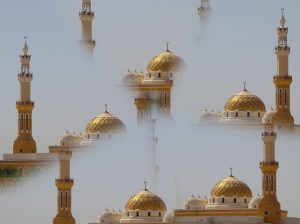
by Mama B (Saudi Arabia) | Feb 25, 2015 | 2015, Government, Grief, Media, Saudi Arabia, Uncategorized, World Events, World Motherhood
 Early in the evening, we heard that he was not doing well. Then again, as is the way here, we had been hearing a great many things since the king had entered the hospital. Although Riyadh, the capital city of Saudi, has a population of four million, it still functions like a little neighborhood. Everyone has a ‘reliable source’ on the inside. As a rule, I do not believe anything until it is officially on the news–and even then, I take it with a grain of salt. Nonetheless, it was hardly a surprise when, at 2:00 AM, Saudi Arabian television announced the death of King Abdullah bin Abdulaziz Al-Saud at the age of 90. Even though I expected the news, it broke my heart.
Early in the evening, we heard that he was not doing well. Then again, as is the way here, we had been hearing a great many things since the king had entered the hospital. Although Riyadh, the capital city of Saudi, has a population of four million, it still functions like a little neighborhood. Everyone has a ‘reliable source’ on the inside. As a rule, I do not believe anything until it is officially on the news–and even then, I take it with a grain of salt. Nonetheless, it was hardly a surprise when, at 2:00 AM, Saudi Arabian television announced the death of King Abdullah bin Abdulaziz Al-Saud at the age of 90. Even though I expected the news, it broke my heart.
I watched the local Saudi channel for a while, then I switched, curious to see how the foreign press would frame the news. They appeared to be competing to see who could be the most negative about Saudi Arabia’s progress under King Abdullah’s reign. Although their own experts pointed to the king’s many accomplishments, the foreign networks seemed to delight in ignoring them and focusing on the dissidents. Reporter after reporter repeated that progress in Saudi was occurring at a ‘glacial rate.’
The western media used its standard to measure my country’s progress.
Maybe they assumed that their standard is the one all the world should aspire to? They ignored how different Saudi is in our priorities, life style, and even our wants and needs. They ignored how young a country we are, and they certainly did not measure how far we have come.
By the morning we had a new king. No bloodshed, no chaos, no ‘state of emergency’, no transitional government. We have come far under King Abdullah’s reign. Yes, Saudis do recognize our shortcomings, and, yes, we do want to–and will–improve. But we should, and will, recognize and celebrate our accomplishments along the way.
We must be doing something right, as we are the most stable country in the region. We are battling the Houthis in the south, ISIS in the north, and successfully fighting terrorism on our own soil, all while growing our universities and health care system. In the past decade, women have been elected to the Shura Council, which advises the king. Twenty-eight universities were built. Two hundred thousand students were given scholarships to universities overseas. Six medical cities were built, 11 specialist hospitals were built, and 32 general hospitals were built. Finally, as a woman in Saudi Arabia, I seen both an expansion of the opportunities I have in my own life, and in the paths that are being laid for my daughter’s future, which far exceed anything available to me when I was her age.
For days after King Abdullah’s death, I could not stop crying. I watched my country mourn on the streets around Saudi. It was as if we had lost our own father. He was so beloved that people who were not related to him, who had never even seen him in the flesh, were giving each other condolences on his loss. His life fulfilled the adage, “When you are born, you cry and the world rejoices. Live your life so that when you die, you rejoice and the word cries.”
Picture attributed to Edward Musiak and used under a Flickr Creative Commons License.

Mama B’s a young mother of four beautiful children who leave her speechless in both, good ways and bad. She has been married for 9 years and has lived in London twice in her life. The first time was before marriage (for 4 years) and then again after marriage and kid number 2 (for almost 2 years). She is settled now in Riyadh, Saudi Arabia (or as settled as one can be while renovating a house).
Mama B loves writing and has been doing it since she could pick up a crayon. Then, for reasons beyond her comprehension, she did not study to become a writer, but instead took graphic design courses. Mama B writes about the challenges of raising children in this world, as it is, who are happy, confident, self reliant and productive without driving them (or herself) insane in the process.
Mama B also sheds some light on the life of Saudi, Muslim children but does not claim to be the voice of all mothers or children in Saudi. Just her little "tribe." She has a huge, beautiful, loving family of brothers and sisters that make her feel like she wants to give her kids a huge, loving family of brothers and sisters, but then is snapped out of it by one of her three monkeys screaming “Ya Maamaa” (Ya being the arabic word for ‘hey’). You can find Mama B writing at her blog, Ya Maamaa . She's also on Twitter @YaMaamaa.
More Posts

by Tinne from Tantrums and Tomatoes | Nov 3, 2014 | Belgium, Cancer, Death and Dying, Grief, Tantrum and Tomatoes, Tinne, Younger Children
 “Are you sad, mommy ? ”
“Are you sad, mommy ? ”
It was my eldest asking. She has a way of noticing these things.
Although the question took me by surprise, I had no alternative but to answer it. Truthfully.
Yes dear, yes. Mommy is sad.
“Why are you sad, Mommy?”
Mommy is sad because bad things are happening to good people. Mommy is sad because she will have to say goodbye to somebody very dear to her much too soon. She is sad because she kept hoping for a miracle of sorts, but it never came.
I know it is OK to feel sad, but I try not to show it in front of my children, for fear that the sadness in my heart will to spill over into theirs. And I don’t want that. My first instinct is – and has always been – to protect my children. Protect them from harm, from illness, from heartbreak. To prolong their innocent happiness.
So instead of crying I try to be cheerful, hiding my worries behind a smile. I try not to upset their secure world more than necessary. But they noticed anyway. Apparently my eyes weren’t smiling anymore.
Serious illness and death which sometimes follows in its wake are new to them. When my father was diagnosed with colon cancer two years ago they were too young to really grasp what was happening. Granddad was sick and in the hospital, the doctor could make him better. He was in the hospital for a long time and visiting was no fun, because the hospital smelled weird.
But now, at 4 and 5 years old, my children are at that age when curiosity for EVERYTHING is at its peak. Although they may not fully grasp the situation or understand the permanence of death or the seriousness of illness, they do notice something is off. And they want answers and when they want answers they turn to ‘Mommypedia’.
There is no need to sit them down at the kitchen table and discuss for half an hour. I let them come to me of their own accord. This usually happens when they are colouring or when I’m driving them somewhere. It is impossible for them to NOT be active in any way, so when the body is forced to remain stationary the mind starts to work.
I try to keep things as simple as possible, try using the same words over and over so they won’t be confused. I compare the body to a clock which is broken and no watchmaker can fix. I explain why I’m sad, what will happen. If necessary I explain four or five times in a row.
But I don’t always have the answers. Even though the questions are so simple.
How do you talk to your children about death and grieving?
This is an original post to World Moms Blog by Tinne of Tantrums & Tomatoes from Belgium. Photo credit to the author.
Born in Belgium on the fourth of July in a time before the invention of the smart phone Tinne is a working mother of two adorably mischievous little girls, the wife of her high school sweetheart and the owner of a black cat called Atilla.
Since she likes to cook her blog is mainly devoted to food and because she is Belgian she has an absurd sense of humour and is frequently snarky. When she is not devoting all her attention to the internet, she likes to read, write and eat chocolate. Her greatest nemesis is laundry.
More Posts - Website
Follow Me:



 Early in the evening, we heard that he was not doing well. Then again, as is the way here, we had been hearing a great many things since the king had entered the hospital. Although Riyadh, the capital city of Saudi, has a population of four million, it still functions like a little neighborhood. Everyone has a ‘reliable source’ on the inside. As a rule, I do not believe anything until it is officially on the news–and even then, I take it with a grain of salt. Nonetheless, it was hardly a surprise when, at 2:00 AM, Saudi Arabian television announced the death of King Abdullah bin Abdulaziz Al-Saud at the age of 90. Even though I expected the news, it broke my heart.
Early in the evening, we heard that he was not doing well. Then again, as is the way here, we had been hearing a great many things since the king had entered the hospital. Although Riyadh, the capital city of Saudi, has a population of four million, it still functions like a little neighborhood. Everyone has a ‘reliable source’ on the inside. As a rule, I do not believe anything until it is officially on the news–and even then, I take it with a grain of salt. Nonetheless, it was hardly a surprise when, at 2:00 AM, Saudi Arabian television announced the death of King Abdullah bin Abdulaziz Al-Saud at the age of 90. Even though I expected the news, it broke my heart.







